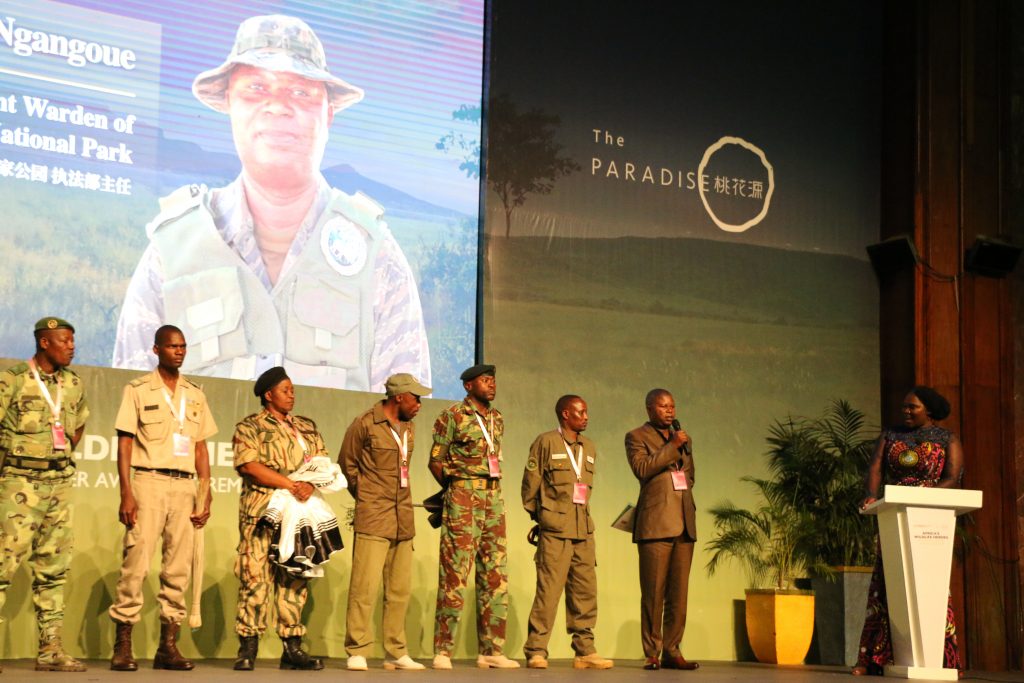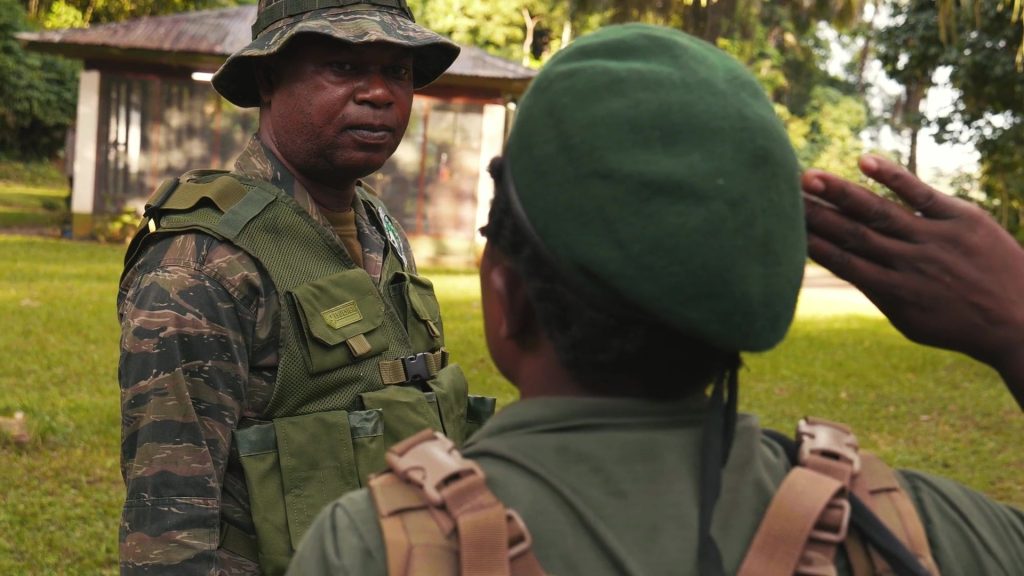Meet Marcel Ngangoue, winner of the African Ranger Award
Marcel Ngangoue won the African Ranger Award 2019, which recognizes and supports the achievements and efforts of rangers working to combat the precipitous decline of Africa’s wildlife species due to poaching, habitat loss, and the illegal wildlife trade.

Marcel got his start at NNNP as deputy to the Park warden at the time,, and then as the first anti-poaching leader for the Project for the Management of Ecosystems in the Periphery of the NNNP (PROGEPP), starting in 1998 and expanding to cover the Kabo, Loundougou, and Pokola concessions for anti-poaching and buffer zone security for NNNP. He worked as the anti-poaching leader with WCS in PROGEPP and then left to attend a 2-years course at the Wildlife School of Garoua in Cameroon. When he returned he was appointed to the Special Anti-Poaching Unit (USLAB) of the Betou-Missa concession North of NNNP. He came back to NNNP in 2015 as Park Warden.
Why did you decide to start your career as a ranger?
My father was a lumberjack. Since I was a child, I knew I wanted to work in forestry. I had the opportunity to attend the National School of Water and Forestry, where I learned the whole chain of forest exploitation, from layering, counting, sorting, felling, marking and cutting, to evacuation. During my studies of the wood industry I was introduced to the field of conservation. My passion has always been protected area management but after graduating from the Garoua Wildlife School in Cameroon I discovered my love for protecting wild animals. I realized that they were being excessively massacred by men, and from then on I committed myself to the sustainability of protected species.
”In a world where population growth goes hand in hand with the demand for space, a protected area is an oasis.
What are your general duties?
Working to conserve a protected area is a demanding responsibility, as I must focus on both improving the well-being of nature and local population. The most important thing is to remember what the protected area used to be and to maintain a long-term vision of what the protected area can be in the future. This is not an easy task. In a world where population growth goes hand in hand with the demand for space, a protected area is an oasis.
I am responsible for ensuring the balance between conservation and resource development. My work ranges from maintaining good relationships with local populations, to welcoming tourists, planning projects and monitoring protected species.
What are the main difficulties you face in your fight against anti-poaching?
Ndoki is one of the world’s primary forests that has never been exploited or inhabited. It is part of the Tri-National de la Sangha, a UNESCO World Heritage Site. But protecting Ndoki is increasingly difficult, as poachers apply very complex operating modes with the use of military weapons.
In 1996, at the very beginning of my conservation career, when I was working as Assistant Conservator for the Eastern Sector of Nouabalé-Ndoki National Park, we were conducting a field patrol to the North-East of the park. We ran into an ambush, followed by an exchange of fire between poachers and our team. Fortunately, no one was injured, despite the fact that the poaching group was larger and better armed than we were.
Today, thanks to the successful management of the Nouabalé-Ndoki Foundation, a public-private partnership between WCS and the Congolese government, the elephant population has remained stable since 2006.
”Protecting Ndoki is increasingly difficult, as poachers apply very complex operating modes with the use of military weapons.
What has been the most moving experience during your career?
In 2016, after months of investigation supported by law enforcement, our teams spotted the leader of one of the largest poaching gangs in the region, Castro, during a hunt. He was arrested and sentenced to 3 years imprisonment. But while he was transferred to prison, he managed to escape from the police and disappeared without ever serving his sentence. Castro was still on the run—seizing his ivory and gunflights with his new gang, the frightening “Guyvanho”, was still frequent. We arrested him again in 2017 and he was sentenced to 5 years in prison. However, after a week he managed to get released and he went back to the Park to continue poaching. In May 2019, his group shot at a mixed mission of law enforcement and eco-guards. A police lieutenant was seriously injured and a female eco-guard from the National Park was hurt. Finally, Castro was arrested in July 2019. We hope that this time he will serve his full sentence.
My last painful experience was the death of one of my eco-guards in 2018. It was during a patrol mission south of Nouabalé-Ndoki National Park, in the peripheral area. He had left his tent during the night to carry out his mission and was bitten by a snake. He did not survive the bite.

What does the African Ranger Award mean to you?
After 23 years as a forest warden, the African Rangers Award is the crowning achievement of
this work. For me, it is a symbol of recognition, and validation and hope for the men and women who defend nature.
I call on the future generations of rangers who will take over the protection of protected areas: be passionate and have confidence in yourself, because the sun will rise.
I am well aware of the inadequacy of national regulations and that the ranger profession is not always valued here. I urge the government to continue promoting training and development of eco-guard management through international partnership, for better visibility of this noble profession.
For the new eco-guards I say: let us all line up for future battles, our conservation ideals will win.


Pingback: New ecoguards strengthen Congo’s wildlife protection ranks – WCS Congo Blog